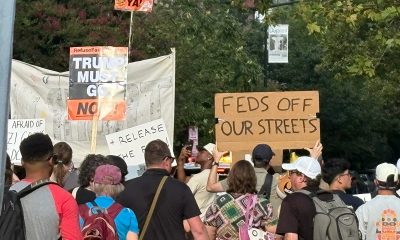Local
Covering Frank Kameny
A reporter’s 35-year journey chronicling the nation’s preeminent gay activist

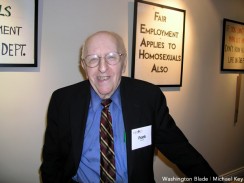
Frank Kameny served as a colorful, reliable source for the Blade and other news outlets during his decades of activism. (Washington Blade photo by Michael Key)
I met Frank Kameny for the first time in the summer of 1974 at a meeting in Washington of the Gay Activists Alliance, now the Gay and Lesbian Activists Alliance.
At 24 years old, I had just landed my first job as a reporter covering the energy and environment beat for a company that published newsletters specializing in reporting on government regulations.
With an undergraduate degree in political science and a year’s worth of graduate studies in journalism under my belt, I walked into that GAA meeting at D.C.’s Quaker Meeting House near Dupont Circle knowing next to nothing about gay rights, gay politics or the gay community.
In the process we know as coming out, I had come to terms with myself as a gay man just months earlier.
So with that as a backdrop, I listened intently to the main topic of the meeting — reports of arrests of gay men at cruising areas by undercover officers assigned to the D.C. police vice squad.
Most of the arrests were not linked to sex in public places, one of the members reported. The men, whom the GAA member described as consenting adults, were merely seeking to meet one another for a sexual tryst or perhaps a lasting friendship that was to take place in the privacy of their homes, not in the public areas where they met.
But in an action I learned later was a routine practice throughout the country at that time, the undercover officers reportedly posed as willing participants and enticed the gay men into “soliciting” them to engage in sodomy, which was a criminal offense that led to an arrest. In some cases the undercover officers used body language suggesting they were inviting the men to touch them in a sexually suggestive way.
If the men took the bait and touched the officers, they were charged with committing a lewd act, a development that could ruin their careers, especially if they worked for the government.
After listening to these reports, a man appearing in his late 40s or early 50s with a booming voice and an obvious thorough knowledge of the issue at hand mapped out a strategy for GAA’s and the gay community’s response: The entrapment arrests of gay men would be portrayed as an “utter” waste of taxpayer’s money and police resources at a time when “real” crime was running rampant in the city.
This self-assured man, who I quickly learned was gay rights pioneer Frank Kameny, raised his voice to emphasize each of his points, attracting the attention of a maintenance worker in the hallway outside the room. He said police officials were unresponsive to earlier requests to stop the entrapment arrests and it was time to take another course of action.
Kameny said GAA should enlist community allies to help it lobby the City Council to eliminate city funding for the vice squad, which was known at the time as the Prostitution, Perversion, and Obscenity (PPO) Branch.
“It’s an outrage and an injustice,” I recall him saying. “We’re citizens of this city. The police, like all government officials, are public servants. And public servants answer to us.”
Much to my amazement, within a year or two, the City Council, voted to eliminate from the police budget funding for the PPO Branch. Although some of its work in the area of prostitution continued, the police practice of entrapment of gay men soon came to an end.
I was naïve and uninformed on the nuances of the gay rights movement when I attended that meeting in 1974. But I knew a good news source when I saw one.
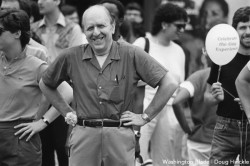
Frank Kameny become known for his sense of humor during his long activist career and feared his tactics would get him disbarred if he had decided to pursue a law degree. (Washington Blade photo by Doug Hinckle)
Frank Kameny over the next 25 years or more was to become my preeminent news source in my coverage of the LGBT community as a reporter for the Washington Blade.
From the start, I had the good fortune of getting to know Frank Kameny and getting a crash course from him on the history of the gay movement and its current struggles and aspirations.
Since Kameny’s death last week, much has been written about his vast contribution to the LGBT movement over a 50-year period, especially in the decade before the Stonewall rebellion of 1969, which is viewed as the starting point of the modern gay movement.
What hasn’t been reported as widely is Kameny’s impact on the lives of individual lesbians, gay men, and transgender people whom he helped and with whom he interacted. His self-confident and assertive demeanor on behalf of the rights of all LGBT people and his unyielding spirit for fighting injustice – no matter how great the odds appeared to be – came across to those around him.
I’ll never forget the story told to me by a gay man I met at a GAA meeting about six months after that first meeting I attended in the summer of 1974. Appearing in his 40s, the man told me he was born and raised in a conservative, fundamentalist Christian household in southern Virginia and had struggled to accept his homosexuality. He said five years of psychotherapy upon moving to the D.C. area had little effect in helping shake his inner struggles over his sexual orientation.
He said his meeting Kameny and other activists at GAA meetings, and subsequent weekly phone conversations with Kameny on a wide range of issues over a period of months, boosted his self-confidence to a degree that he could never attain in years of therapy.
“I fired my therapist,” he told me while smiling broadly “Frank and the other folks here gave me the insight to understand that the external forces of discrimination and oppression and homophobia are what got me down,” I recall him saying.
Kameny’s assistance to individual LGBT people blossomed in his role as a paralegal counsel representing gays encountering problems with security clearances in the late 1960s through the 1980s. When his clients were comfortable going public with their case, Kameny provided me with copies of his legal briefs challenging actions by various U.S. government agencies, often the Defense Department, seeking to deny or revoke a gay person’s security clearance.
Those targeted for loss of a clearance usually worked for the government or for a private company doing contract work for the government. The main argument used for revoking a clearance was that gay people were susceptible to blackmail and were thus a threat to the safeguarding of government secrets.
Kameny often argued that the government had yet to disclose a single case where a gay person breached government secrets due to blackmail or coercion related to his or her sexual orientation.
He noted that government security officials appeared to be obsessed with the private sex lives of gays holding security clearances. In the course of investigating a gay person over a clearance, security officials demanded to know the identities of all of their sex partners over a period of years and insisted they reveal the specific types of sexual acts the gay person performed with his or her partners.
Kameny’s characteristic response to these inquires surfaced in a 1969 case in which he represented a New York gay man named Benning Wentworth, whose application for a clearance was opposed by the government solely on grounds of his status as a “sexually active” homosexual.
“We state to the world, as we have stated for the public, we state for the record and, if the [Defense] Department forces us to carry the case that far, we state for the courts that Mr. Wentworth, being a healthy, unmarried, homosexual male, 35 years old, has lived, and does live a suitable homosexual life, in parallel with the suitable active heterosexual sexual life lived by 75 percent of our healthy, unmarried, heterosexual males holding security clearances,” Kameny stated in a government hearing to adjudicate Wentworth’s clearance application.
Added Kameny, “Mr. Wentworth will get his clearance as the sexually active homosexual that he is and that he will continue to be…just as heterosexuals get their clearances as sexually active heterosexuals.”
He won many of his cases when, at his suggestion, his clients submitted letters disclosing their sexual orientation to co-workers and family members, eliminating, in Kameny’s assessment, any chance of blackmail threats to reveal the client’s homosexuality.
Some of his clients and fellow activists urged Kameny to get his law degree and become a lawyer, noting that he already knew more about the field of security clearance law than most lawyers. He told me his becoming a lawyer would tie his hands, saying the sometimes outlandish tactics he used would get him disbarred.
“They can’t disbar me if I’m not a member of the bar,” he often said.
In cases where he represented members of the military under investigation for being gay in the years prior to “Don’t Ask, Don’t Tell,” Kameny was blunt about the only means of preventing a discharge: “Lie through your teeth,” he told his clients, or refuse to answer any questions about your sexual orientation.
In one of his military cases in the 1980s, Kameny was scheduled to attend a hearing to discuss planned action by the Army to discharge a service member who was identified as being gay by an acquaintance who was pressured into “snitching” on his fellow service member, as Kameny put it.
For some reason, Army officials insisted on meeting with the service member in private, saying Kameny couldn’t attend that particular session, in which the service member was to be “interviewed,” Kameny said.
As a gesture of protest, Kameny placed his foot in the doorway of the meeting room, preventing one of the officials from closing the door. He backed down after being threatened with arrest, saying the gesture was intended to emphasize his strong opposition to the closed meeting.
His use of fiery language as well as humor often surfaced in his testimony before public hearings held by governmental bodies, including the D.C. City Council.
In the early 1990s, Kameny testified before a D.C. Council committee deliberating over a proposed alley closing sought by Georgetown University to clear the way for construction of a new law school building located near the U.S. Capitol.
Gay activists, led by Kameny and GAA, called on the Council to withhold approval of the alley closing and thus prevent construction of the building until the university ended its policy of refusing to recognize gay student groups on campus.
Shortly after beginning his testimony, Kameny opened his briefcase and pulled out a spray can that he identified as a room deodorizer. He pressed down on the nozzle, spraying a mist in the direction of the Council members seated about 10 feet in front of him.
The “stench of discrimination” being carried out by Georgetown University against gay student groups cannot continue, he said, drawing laughter from the Council members and the audience in the hearing room.
Kameny also directed his sense of humor toward anti-gay organizations, which he closely monitored. On several occasions during the 1980s and 1990s he rushed to the city’s office of corporations and created his own corporation under the exact name of an anti-gay group, preventing the group from setting up its own corporation to do business in D.C.
Although he’s known mostly for his work in the LGBT rights movement, Kameny contributed his talents to other progressive causes. He became the first open gay to be appointed to a prominent city post in the 1970s, when Walter Washington, the city’s first mayor under D.C.’s newly acquired home rule government, named Kameny to the D.C. Commission on Human Rights.
In the early 1980s, Kameny won election to the D.C. Statehood Constitutional Convention and played a lead role in drafting a constitution for the proposed State of New Columbia.
During all of his years as an activist and movement leader in which I had the privilege to cover him, Kameny excelled as a news source in more stories than I can count. Thank you, Frank. You’ll be sorely missed.
District of Columbia
Imperial Court of Washington drag group has ‘dissolved’
Board president cites declining support since pandemic
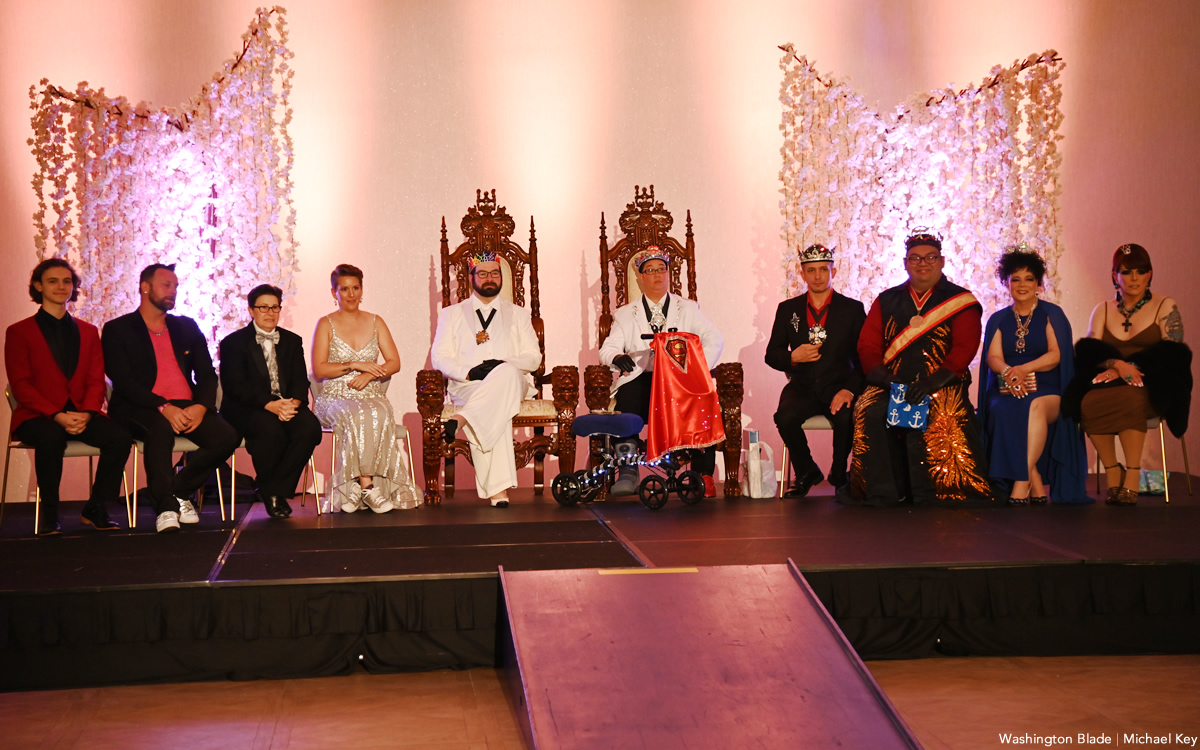
The Imperial Court of Washington, a D.C.-based organization of drag performers that has raised at least $250,000 or more for local LGBTQ and non-LGBTQ charitable groups since its founding in 2010, announced on Jan. 5 that it has ended its operations by dissolving its corporate status.
In a Jan. 5 statement posted on Facebook, Robert Amos, president of the group’s board of directors, said the board voted that day to formally dissolve the organization in accordance with its bylaws.
“This decision was made after careful consideration and was based on several factors, including ongoing challenges in adhering to the bylaws, maintaining compliance with 501(c)(3) requirements, continued lack of member interest and attendance, and a lack of community involvement and support as well,” Amos said in his statement.
He told the Washington Blade in a Jan. 6 telephone interview that the group was no longer in compliance with its bylaws, which require at least six board members, when the number of board members declined to just four. He noted that the lack of compliance with its bylaws also violated the requirements of its IRS status as a nonprofit, tax-exempt 501(c) (3) organization.
According to Amos, the inability to recruit additional board members came at a time when the organization was continuing to encounter a sharp drop in support from the community since the start of the COVID pandemic around 2020 and 2021.
Amos and longtime Imperial Court of Washington member and organizer Richard Legg, who uses the drag name Destiny B. Childs, said in the years since its founding, the group’s drag show fundraising events have often been attended by 150 or more people. They said the events have been held in LGBTQ bars, including Freddie’s Beach Bar in Arlington, as well as in other venues such as theaters and ballrooms.
Among the organizations receiving financial support from Imperial Court of Washington have been SMYAL, PFLAG, Whitman-Walker Health’s Walk to End HIV, Capital Pride Alliance, the DC LGBT Community Center, and the LGBTQ Fallen Heroes Fund. Other groups receiving support included Pets with Disabilities, the Epilepsy Foundation of Washington, and Grandma’s House.
The Imperial Court of Washington’s website, which was still online as of Jan. 6, says the D.C. group has been a proud member of the International Court System, which was founded in San Francisco in 1965 as a drag performance organization that evolved into a charitable fundraising operation with dozens of affiliated “Imperial Court” groups like the one in D.C.
Amos, who uses the drag name Veronica Blake, said he has heard that Imperial Court groups in other cities including Richmond and New York City, have experienced similar drops in support and attendance in the past year or two. He said the D.C. group’s events in the latter part of 2025 attracted 12 or fewer people, a development that has prevented it from sustaining its operations financially.
He said the membership, which helped support it financially through membership dues, has declined in recent years from close to 100 to its current membership of 21.
“There’s a lot of good we have done for the groups we supported, for the charities, and the gay community here,” Amos said. “It is just sad that we’ve had to do this, mainly because of the lack of interest and everything going on in the world and the national scene.”
Virginia
LGBTQ groups to join Spanberger inaugural parade
Virginia Pride among more than 25 orgs to march in Jan.17 event
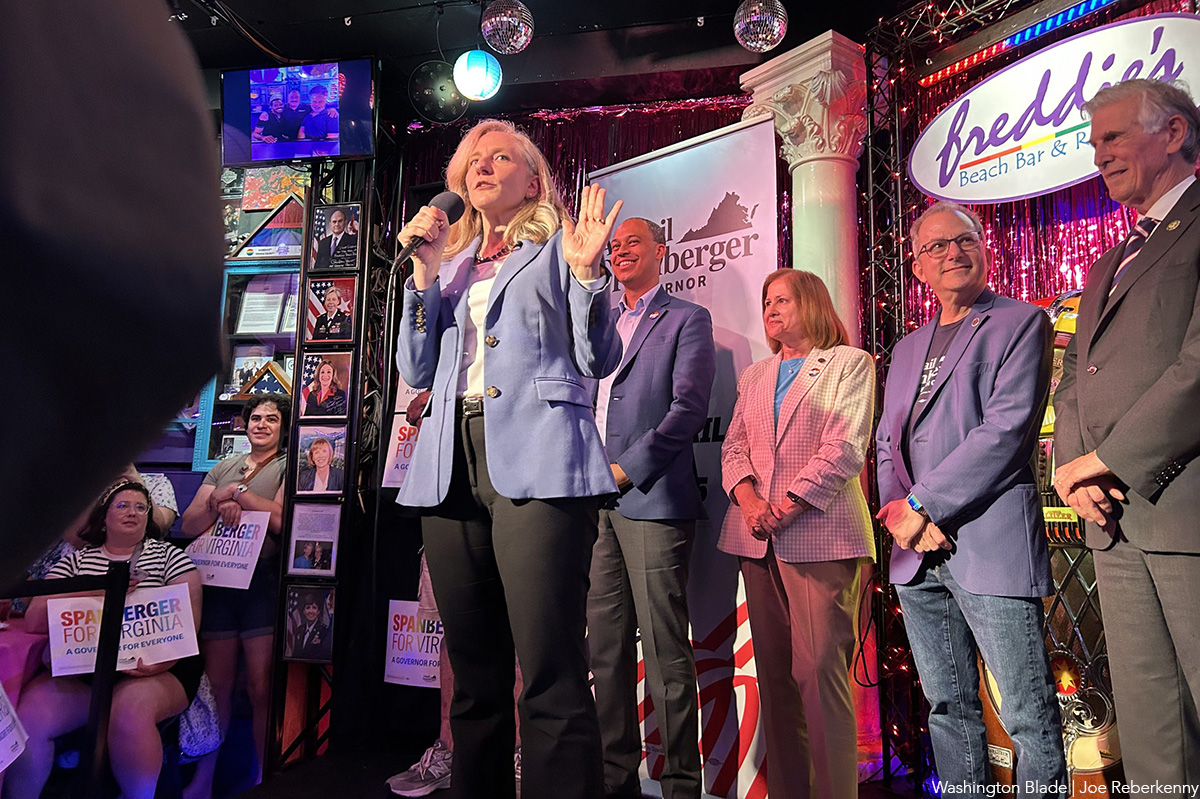
Virginia Gov.-Elect Abigail Spanberger’s inaugural committee announced on Jan. 2 that at least two LGBTQ organizations will be among more than 25 state-based organizations, including marching bands, that will participate in her inaugural parade on Jan. 17.
A statement released by the inaugural committee says the parade will take place immediately after Spanberger is sworn in as Virginia’s 75th governor and delivers her inaugural address in Richmond.
The statement lists the LGBTQ groups Virginia Pride and Diversity Richmond as two groups participating in the parade, although the two groups merged in 2021, with Virginia Pride becoming a project of Diversity Richmond. Among other things, Virginia Pride organizes Richmond’s annual LGBTQ Pride events.
“A display of the impressive talent and beauty of every corner of Virginia, our inaugural parade will be a celebration of all that makes our Commonwealth strong,” Spanberger said in the Jan. 2 statement. “I’m excited for attendees in the stands on Capitol Square and families watching together at home to see this incredible showing of Virginia pride,” she said.
James Millner, who serves as director of Virginia Pride, told the Washington Blade about 75 people are expected to join the Virginia Pride-Diversity Richmond contingent in the parade. He said among them will be members of other Virginia LGBTQ organizations.
“We’re going to invite our staff, our board, our volunteers, and our community partners to join us,” Millner said.
“We are thrilled and honored to have been invited to participate in Abigail Spanberger’s inauguration festivities,” he added. “I think this represents a marked change from the previous administration and demonstrates what she campaigned on – which is she sees the diversity of the Commonwealth as a strength that needs to be celebrated,” he said. “And we are very happy that she has invited us to represent the diversity of the commonwealth.”
Millner appeared to reflect on the sentiment of the large majority of Virginia’s LGBTQ community in its support for Democrat Spanberger over Republican Lt. Gov. Winsome Earle-Sears in the November 2025 Virginia election and the end of incumbent GOP Gov. Glenn Youngkin’s term in office on Jan. 17.
“After what we’ve been through with the Younkin administration, especially in its treatment of LGBTQ folks, especially transgender and nonconforming folks, I think we are all breathing easy and excited about what opportunities will exist in working with Abigail Spanberger,” he told the Blade.
District of Columbia
Two pioneering gay journalists to speak at Thursday event
Blade’s Chibbaro, Falls Church News-Press’s Benton talk long careers
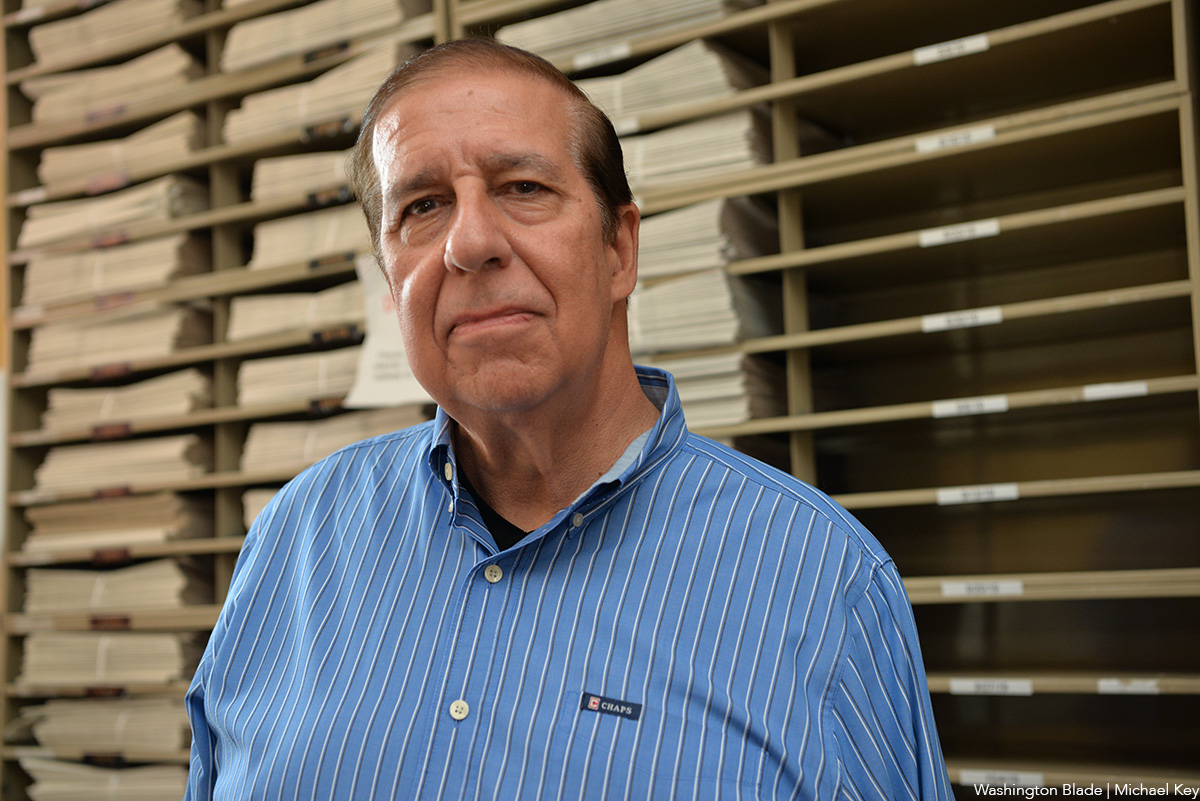
Two local gay journalists will speak on a panel this week about their long, pioneering careers.
A celebration of the Falls Church News-Press’s Nicholas Benton and the Washington Blade’s Lou Chibbaro Jr., two trailblazing LGBTQ journalists who have spent decades reporting on the front lines of social, cultural, legal, and political change in America, will be held this Thursday, Jan. 8, at the Women’s National Democratic Club of Washington. D.C., 1526 New Hampshire Avenue, N.W., at 6 p.m., according to a statement from organizers.
The program will explore their journeys, the evolution of LGBTQ journalism, and the ongoing fight for equality and justice. Benton and Chibbaro will also examine the various factors causing many news outlets to cease print publication and their energetic efforts to continue publishing their work both in print and online.
EVENT DETAILS:
- Remarks and Q&A, in-person and via Zoom.
- 6 p.m. complimentary hors d’oeuvres and cash bar; 6:30–7:30 p.m. program followed by book signing.
- Zoom only: $10. In-person: members: $20, nonmembers: $30 plus tax.
Benton’s latest book, “Please Don’t Eat Your Children, Cult Century, and Other Essays,” will be available for purchase at the event.
Benton is a longtime local journalist and LGBTQ rights activist whose work has had a lasting impact on both community journalism and social justice. Author of the first-ever editorial in the pioneering Gay Sunshine newspaper in 1970, he is best known as the founder, owner, and editor of the Falls Church News-Press, an independent weekly newspaper he launched in 1991 and is the paper of record for the City of Falls Church, Virginia.
Chibbaro is the senior news reporter for the Washington Blade and a pioneering journalist in LGBTQ news coverage. He has reported on the LGBTQ rights movement and community continuously since 1976, first as a freelance writer and later as a staff reporter, joining the Blade in 1984.





